Unit2 Kaite always gets up early 课件(35张ppt)
文档属性
| 名称 | Unit2 Kaite always gets up early 课件(35张ppt) |

|
|
| 格式 | zip | ||
| 文件大小 | 3.4MB | ||
| 资源类型 | 试卷 | ||
| 版本资源 | 湘少版 | ||
| 科目 | 英语 | ||
| 更新时间 | 2020-09-23 17:39:33 | ||
图片预览


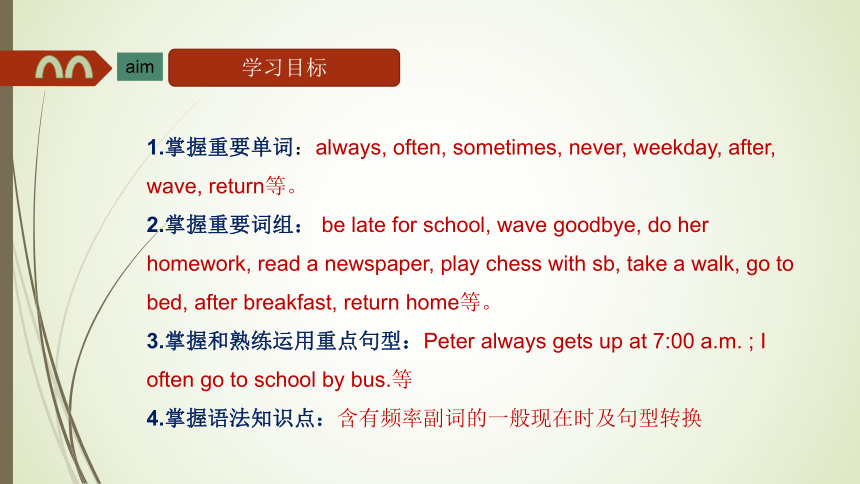
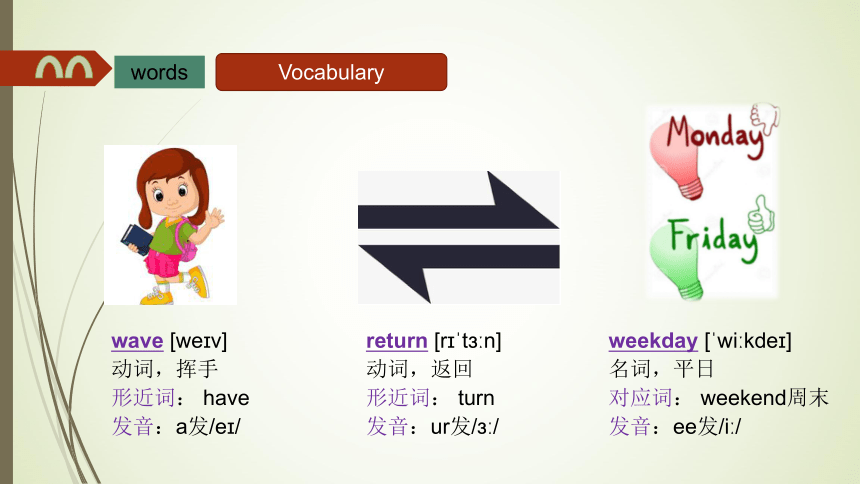
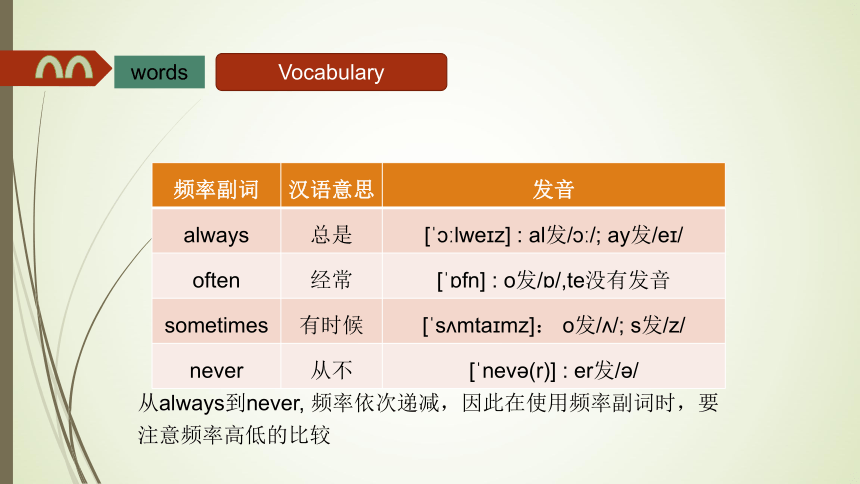
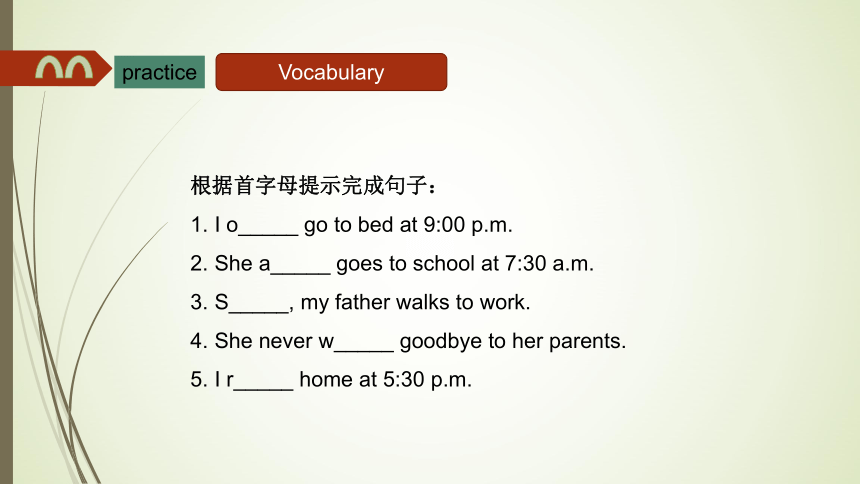
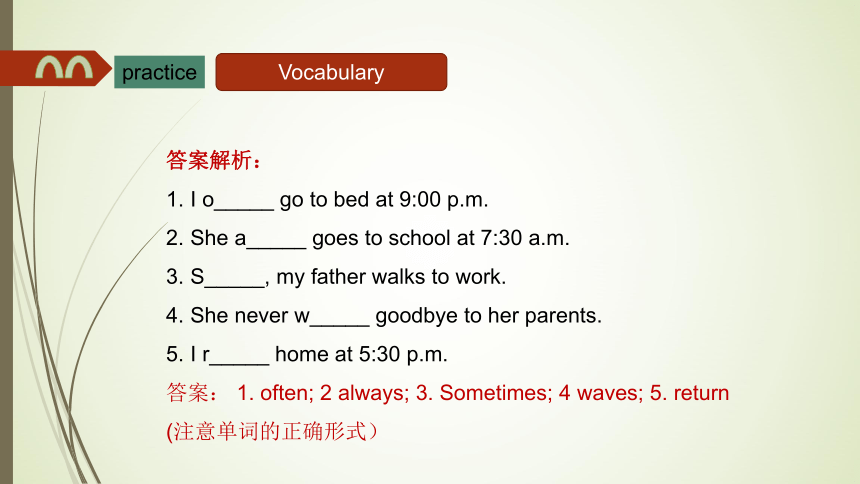
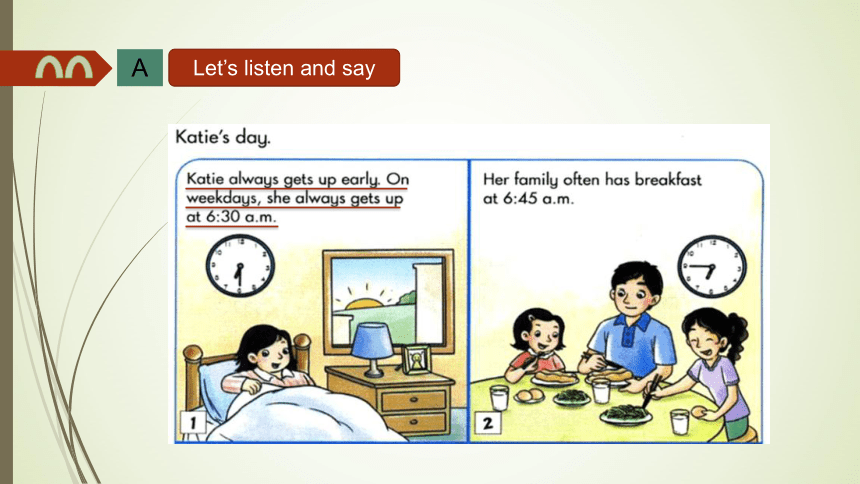
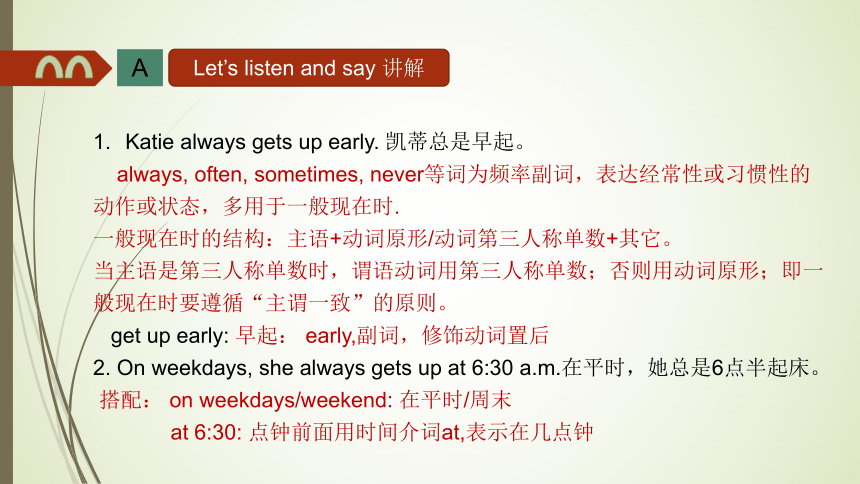
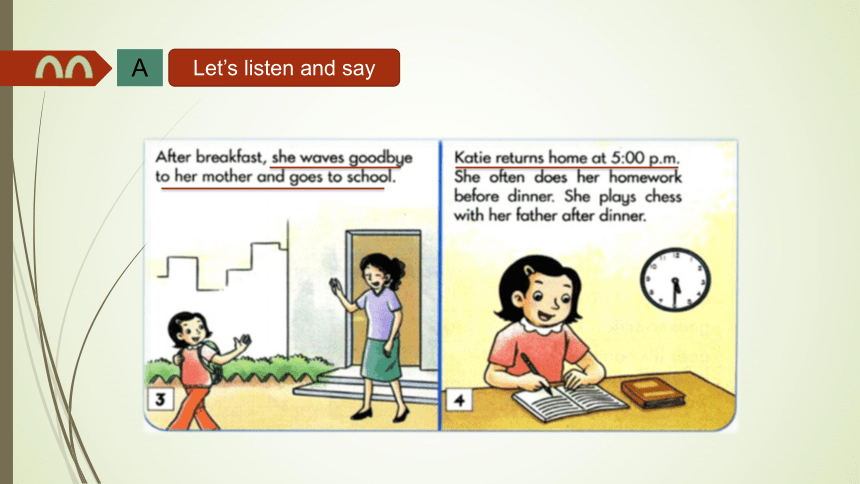
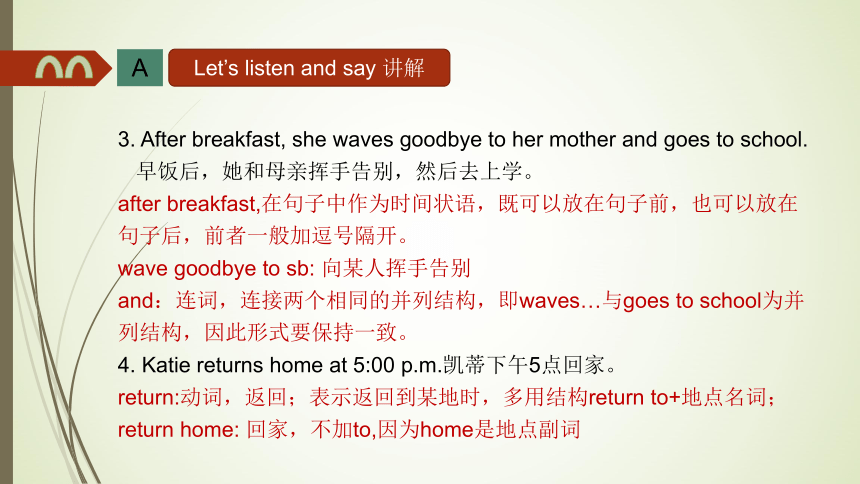

文档简介
(共35张PPT)
Unit2
Katie
always
gets
up
early.
湘少版
六年级上
Unit2:
Katie
always
gets
up
early.
aim
学习目标
1.掌握重要单词:always,
often,
sometimes,
never,
weekday,
after,
wave,
return等。
2.掌握重要词组:
be
late
for
school,
wave
goodbye,
do
her
homework,
read
a
newspaper,
play
chess
with
sb,
take
a
walk,
go
to
bed,
after
breakfast,
return
home等。
3.掌握和熟练运用重点句型:Peter
always
gets
up
at
7:00
a.m.
;
I
often
go
to
school
by
bus.等
4.掌握语法知识点:含有频率副词的一般现在时及句型转换
words
Vocabulary
wave
[we?v]
动词,挥手
形近词:
have
发音:a发/e?/
return
[r??t??n]
动词,返回
形近词:
turn
发音:ur发/??/
weekday
[?wi?kde?]
名词,平日
对应词:
weekend周末
发音:ee发/i?/
words
Vocabulary
频率副词
汉语意思
发音
always
总是
[???lwe?z]
:
al发/??/;
ay发/e?/
often
经常
[??fn]
:
o发/?/,te没有发音
sometimes
有时候
[?s?mta?mz]:
o发/?/;
s发/z/
never
从不
[?nev?(r)]
:
er发/?/
从always到never,
频率依次递减,因此在使用频率副词时,要注意频率高低的比较
practice
Vocabulary
根据首字母提示完成句子:
I
o_____
go
to
bed
at
9:00
p.m.
She
a_____
goes
to
school
at
7:30
a.m.
S_____,
my
father
walks
to
work.
She
never
w_____
goodbye
to
her
parents.
I
r_____
home
at
5:30
p.m.
practice
Vocabulary
答案解析:
I
o_____
go
to
bed
at
9:00
p.m.
She
a_____
goes
to
school
at
7:30
a.m.
S_____,
my
father
walks
to
work.
She
never
w_____
goodbye
to
her
parents.
I
r_____
home
at
5:30
p.m.
答案:
1.
often;
2
always;
3.
Sometimes;
4
waves;
5.
return
(注意单词的正确形式)
A
Let’s
listen
and
say
A
Let’s
listen
and
say
讲解
Katie
always
gets
up
early.
凯蒂总是早起。
always,
often,
sometimes,
never等词为频率副词,表达经常性或习惯性的动作或状态,多用于一般现在时.
一般现在时的结构:主语+动词原形/动词第三人称单数+其它。
当主语是第三人称单数时,谓语动词用第三人称单数;否则用动词原形;即一般现在时要遵循“主谓一致”的原则。
get
up
early:
早起:
early,副词,修饰动词置后
2.
On
weekdays,
she
always
gets
up
at
6:30
a.m.在平时,她总是6点半起床。
搭配:
on
weekdays/weekend:
在平时/周末
at
6:30:
点钟前面用时间介词at,表示在几点钟
A
Let’s
listen
and
say
A
Let’s
listen
and
say
讲解
3.
After
breakfast,
she
waves
goodbye
to
her
mother
and
goes
to
school.
早饭后,她和母亲挥手告别,然后去上学。
after
breakfast,在句子中作为时间状语,既可以放在句子前,也可以放在句子后,前者一般加逗号隔开。
wave
goodbye
to
sb:
向某人挥手告别
and:连词,连接两个相同的并列结构,即waves…与goes
to
school为并列结构,因此形式要保持一致。
4.
Katie
returns
home
at
5:00
p.m.凯蒂下午5点回家。
return:动词,返回;表示返回到某地时,多用结构return
to+地点名词;
return
home:
回家,不加to,因为home是地点副词
A
随堂小测试
单项选择:
Katie
always
_____
up
early.
A
get
B
gets
C
got
2.
Katie
returns
home
_____5:00.p.m.
A
on
B
in
C
at
She
waves
goodbye
to
her
mother
and
____
to
school.
A
goes
B
go
C
went
4.
She
plays
chess
___
her
father
after
dinner.
A
on
B
with
C
and
5.
____
weekdays,
she
goes
to
bed
at
9:30
p.m.
A
On
B
In
C
At
A
随堂小测试
答案解析:
Katie
always
_____
up
early.
(一般现在时,主语是第三人称单数)
A
get
B
gets
C
got
2.
Katie
returns
home
_____5:00.p.m.(点钟前面用时间介词at)
A
on
B
in
C
at
3.
She
waves
goodbye
to
her
mother
and
____
to
school.
(and连接两个相同形式的并列结构)
A
goes
B
go
C
went
4.
She
plays
chess
___
her
father
after
dinner.(play
chess
with
sb)
A
on
B
with
C
and
5.
____
weekdays,
she
goes
to
bed
at
9:30
p.m.(on
weekdays,习惯搭配)
A
On
B
In
C
At
B
Let’s
learn
例句:
I
often
wave
goodbye
to
my
classmates.
I
am
often
late
for
school.
B
随堂小测试
单项选择:
She
is
always
late
_____
school.
A
to
B
for
C
at
I
like
_____
a
newspaper.
A
read
B
watching
C
reading
3.
She
often
takes
_____
walk
after
dinner.
A
/
B
the
C
a
4.
She
often
does
_____
homework
before
dinner.
A
she
B
her
C
his
She
is
_____
late.
Everyone
likes
her.
A
always
B
sometimes
C
never
B
随堂小测试
答案解析:
She
is
always
late
_____
school.
(be
late
for为固定搭配)
A
to
B
for
C
at
I
like
_____
a
newspaper.(like
doing
sth;
newspaper前搭配动词read)
A
read
B
watching
C
reading
3.
She
often
takes
_____
walk
after
dinner.(take
a
walk为固定搭配)
A
/
B
the
C
a
4.
She
often
does
_____
homework
before
dinner.(her与主语保持一致,修饰名词)
A
she
B
her
C
his
She
is
_____
late.
Everyone
likes
her.(根据翻译)
A
always
B
sometimes
C
never
C
Let’s
Practise
重点句型:
Peter
always
gets
up
at
7:00
a.m.
C
随堂小测试
根据表格内容写四组句子:
Tim
always
often
sometimes
never
have
breakfast
at
7:00
a.m.
?
go
to
school
at
7:30
a.m.
?
return
home
at
5:30
p.m.
?
go
to
bed
at
10:00
p.m.
?
___________________________________________
___________________________________________
___________________________________________
___________________________________________
C
随堂小测试
答案参考:
Tim
always
often
sometimes
never
have
breakfast
at
7:00
a.m.
?
go
to
school
at
7:30
a.m.
?
return
home
at
5:30
p.m.
?
go
to
bed
at
10:00
p.m.
?
Tim
often
has
breakfast
at
7:00
a.m.
Tim
always
goes
to
school
at
7:30
a.m.
Tim
sometimes
returns
home
at
5:30
p.m.
Tim
never
goes
to
bed
at
10:00
p.m.
注意:
频率副词一般放在实意动词之前,be动词之后,其中sometimes可以放在句首
D
Let’s
Read
笔记:
study:动词,学习,研究;作为名词表示“书房”
like
to
do
sth:
喜欢做某事,一般与like
doing
sth不做区分
listen
to+宾语:
听…
take
photos
of…给…拍照
well:
good的副词形式,修饰动词,置后.
a
few:
一些,修饰可数名词复数;
few表示几乎没有
wait
for…:等待…
be
going
to
do:
打算做某事
D
Let’s
Read
Answer
the
questions:
What
does
John
do?
He
is
___________________________
2.
What
does
John
study?
He
studies
__________________
3.
What
did
he
see
yesterday?
He
_______________________
4.
What
is
he
going
to
do
today?
____________________________
D
Let’s
Read
答案参考:
What
does
John
do?
He
is
a
scientist.
2.
What
does
John
study?
He
studies
birds.
3.
What
did
he
see
yesterday?
He
saw
a
few
beautiful
birds.
4.
What
is
he
going
to
do
today?
He
is
going
to
observe
beautiful
birds
and
take
photos
of
them.
E
Let’s
Write
根据实际情况填写
E
随堂小测试
按要求写句子:
What
does
she
often
do
on
Weekends?(clean
the
room)
____________________________________
2.
I
often
go
to
bed
at
9:30
p.m.(对划线部分提问)
______________________________________
3.
Katie
always
does
her
homework
before
dinner.(变一般疑问句)
______________________________________
4.
我上学从不迟到。(汉译英)
______________________________________
E
随堂小测试
答案解析:
What
does
she
often
do
on
Weekends?(clean
the
room)
She
often
cleans
the
room.
(用一般现在时问,用一般现在时回答,根据主语是第三人称单数,故谓语动词也用第三人称单数形式)
2.
I
often
go
to
bed
at
9:30
p.m.(对划线部分提问)
When
do
you
often
go
to
bed?
(对时间提问,用when,根据谓语动词为原形,选择主动词do,第一人称变第二人称,其它不变)
3.
Katie
always
does
her
homework
before
dinner.(变一般疑问句)
Does
Katie
always
do
her
homework
before
dinner?(变一般疑问句,根据谓语动词是第三人称单数,故选助动词does,
助动词后加动词原形,故原句中的谓语动词does变do)
4.
我上学从不迟到。(汉译英)
I
am
never
late
for
school.
F
Let’s
Have
Fun
笔记:
snail:
蜗牛
shell:
壳
mice:
mouse的复数
I
always
carry
my
house
about.
我总是到处搬家
总
Summary
重点单词:
动词:wave,
return
副词:always,
often,
sometimes,
never
名词:weekday
重点词组和搭配:
be
late
for
school,
wave
goodbye,
do
her
homework,
read
a
newspaper,
play
chess
with
sb,
take
a
walk,
go
to
bed,
after
breakfast,
return
home
等。
重点句型:Katie
always
gets
up
early.
She
often
goes
to
bed
at
9:00
p.m.
语法:一般现在时及句型转换
总
单元测试
一、单项选择:
Katie
plays
chess
____
her
father
after
dinner.
A
and
B
with
C
by
2.
My
father
always
_____
a
newspaper
before
breakfast.
A
read
B
reading
C
reads
3.
They
always
have
____
breakfast
at
6:45
a.m.
A
the
B
/
C
a
4.
Ann
often
____
to
school
at
7:00
a.m.
A
goes
B
go
C
went
Does
Tony
____a
walk
after
dinner?
A
takes
B
took
C
take
总
单元测试
答案解析:
Katie
plays
chess
____
her
father
after
dinner.(play
chess
with
sb)
A
and
B
with
C
by
2.
My
father
always
_____
a
newspaper
before
breakfast.(考察一般现在时的核心结构,always定位时态为一般现在时,主语是第三人称单数,故动词用单数)
A
read
B
reading
C
reads
3.
They
always
have
____
breakfast
at
6:45
a.m.
(have
breakfast/
dinner/
lunch)
A
the
B
/
C
a
4.
Ann
often
____
to
school
at
7:00
a.m.
(同2)
A
goes
B
go
C
went
Does
Tony
____a
walk
after
dinner?
(助动词后面加动词原形,与主语和时态无关)
A
takes
B
took
C
take
总
单元测试
二、用所给单词的适当形式填空:
Peter
often
_____(watch)
TV
on
Sundays.
She
_____(read)
many
books
last
month.
Sometimes,
Ann
_____(go)
to
school
on
foot.
What
does
she
_____(learn)
on
weekdays?
What
did
he
_____(practice)
during
the
holidays?
总
单元测试
答案解析:
Peter
often
_____(watch)
TV
on
Sundays.
She
_____(read)
many
books
last
month.
Sometimes,
Ann
_____(go)
to
school
on
foot.
What
does
she
_____(learn)
on
weekdays?
What
did
he
_____(practice)
during
the
holidays?
答案:
1.
watches;
2.
read;
3.
goes;
4.
learn;
5.
practice
时态辨析题的特征:
考察谓语动词的形式
技巧:时间状语定位时态,根据时态或主语确定动词的形式,
助动词后面加动词原形
课后作业
以“My
daily
life”我的日常生活为题,写一篇不少于8句话的小作文:
My
daily
life
____________________________________________
____________________________________________
____________________________________________
____________________________________________
____________________________________________
Thanks
a
lot
谢谢
21世纪教育网(www.21cnjy.com)
中小学教育资源网站
有大把高质量资料?一线教师?一线教研员?
欢迎加入21世纪教育网教师合作团队!!月薪过万不是梦!!
详情请看:
https://www.21cnjy.com/help/help_extract.php
Unit2
Katie
always
gets
up
early.
湘少版
六年级上
Unit2:
Katie
always
gets
up
early.
aim
学习目标
1.掌握重要单词:always,
often,
sometimes,
never,
weekday,
after,
wave,
return等。
2.掌握重要词组:
be
late
for
school,
wave
goodbye,
do
her
homework,
read
a
newspaper,
play
chess
with
sb,
take
a
walk,
go
to
bed,
after
breakfast,
return
home等。
3.掌握和熟练运用重点句型:Peter
always
gets
up
at
7:00
a.m.
;
I
often
go
to
school
by
bus.等
4.掌握语法知识点:含有频率副词的一般现在时及句型转换
words
Vocabulary
wave
[we?v]
动词,挥手
形近词:
have
发音:a发/e?/
return
[r??t??n]
动词,返回
形近词:
turn
发音:ur发/??/
weekday
[?wi?kde?]
名词,平日
对应词:
weekend周末
发音:ee发/i?/
words
Vocabulary
频率副词
汉语意思
发音
always
总是
[???lwe?z]
:
al发/??/;
ay发/e?/
often
经常
[??fn]
:
o发/?/,te没有发音
sometimes
有时候
[?s?mta?mz]:
o发/?/;
s发/z/
never
从不
[?nev?(r)]
:
er发/?/
从always到never,
频率依次递减,因此在使用频率副词时,要注意频率高低的比较
practice
Vocabulary
根据首字母提示完成句子:
I
o_____
go
to
bed
at
9:00
p.m.
She
a_____
goes
to
school
at
7:30
a.m.
S_____,
my
father
walks
to
work.
She
never
w_____
goodbye
to
her
parents.
I
r_____
home
at
5:30
p.m.
practice
Vocabulary
答案解析:
I
o_____
go
to
bed
at
9:00
p.m.
She
a_____
goes
to
school
at
7:30
a.m.
S_____,
my
father
walks
to
work.
She
never
w_____
goodbye
to
her
parents.
I
r_____
home
at
5:30
p.m.
答案:
1.
often;
2
always;
3.
Sometimes;
4
waves;
5.
return
(注意单词的正确形式)
A
Let’s
listen
and
say
A
Let’s
listen
and
say
讲解
Katie
always
gets
up
early.
凯蒂总是早起。
always,
often,
sometimes,
never等词为频率副词,表达经常性或习惯性的动作或状态,多用于一般现在时.
一般现在时的结构:主语+动词原形/动词第三人称单数+其它。
当主语是第三人称单数时,谓语动词用第三人称单数;否则用动词原形;即一般现在时要遵循“主谓一致”的原则。
get
up
early:
早起:
early,副词,修饰动词置后
2.
On
weekdays,
she
always
gets
up
at
6:30
a.m.在平时,她总是6点半起床。
搭配:
on
weekdays/weekend:
在平时/周末
at
6:30:
点钟前面用时间介词at,表示在几点钟
A
Let’s
listen
and
say
A
Let’s
listen
and
say
讲解
3.
After
breakfast,
she
waves
goodbye
to
her
mother
and
goes
to
school.
早饭后,她和母亲挥手告别,然后去上学。
after
breakfast,在句子中作为时间状语,既可以放在句子前,也可以放在句子后,前者一般加逗号隔开。
wave
goodbye
to
sb:
向某人挥手告别
and:连词,连接两个相同的并列结构,即waves…与goes
to
school为并列结构,因此形式要保持一致。
4.
Katie
returns
home
at
5:00
p.m.凯蒂下午5点回家。
return:动词,返回;表示返回到某地时,多用结构return
to+地点名词;
return
home:
回家,不加to,因为home是地点副词
A
随堂小测试
单项选择:
Katie
always
_____
up
early.
A
get
B
gets
C
got
2.
Katie
returns
home
_____5:00.p.m.
A
on
B
in
C
at
She
waves
goodbye
to
her
mother
and
____
to
school.
A
goes
B
go
C
went
4.
She
plays
chess
___
her
father
after
dinner.
A
on
B
with
C
and
5.
____
weekdays,
she
goes
to
bed
at
9:30
p.m.
A
On
B
In
C
At
A
随堂小测试
答案解析:
Katie
always
_____
up
early.
(一般现在时,主语是第三人称单数)
A
get
B
gets
C
got
2.
Katie
returns
home
_____5:00.p.m.(点钟前面用时间介词at)
A
on
B
in
C
at
3.
She
waves
goodbye
to
her
mother
and
____
to
school.
(and连接两个相同形式的并列结构)
A
goes
B
go
C
went
4.
She
plays
chess
___
her
father
after
dinner.(play
chess
with
sb)
A
on
B
with
C
and
5.
____
weekdays,
she
goes
to
bed
at
9:30
p.m.(on
weekdays,习惯搭配)
A
On
B
In
C
At
B
Let’s
learn
例句:
I
often
wave
goodbye
to
my
classmates.
I
am
often
late
for
school.
B
随堂小测试
单项选择:
She
is
always
late
_____
school.
A
to
B
for
C
at
I
like
_____
a
newspaper.
A
read
B
watching
C
reading
3.
She
often
takes
_____
walk
after
dinner.
A
/
B
the
C
a
4.
She
often
does
_____
homework
before
dinner.
A
she
B
her
C
his
She
is
_____
late.
Everyone
likes
her.
A
always
B
sometimes
C
never
B
随堂小测试
答案解析:
She
is
always
late
_____
school.
(be
late
for为固定搭配)
A
to
B
for
C
at
I
like
_____
a
newspaper.(like
doing
sth;
newspaper前搭配动词read)
A
read
B
watching
C
reading
3.
She
often
takes
_____
walk
after
dinner.(take
a
walk为固定搭配)
A
/
B
the
C
a
4.
She
often
does
_____
homework
before
dinner.(her与主语保持一致,修饰名词)
A
she
B
her
C
his
She
is
_____
late.
Everyone
likes
her.(根据翻译)
A
always
B
sometimes
C
never
C
Let’s
Practise
重点句型:
Peter
always
gets
up
at
7:00
a.m.
C
随堂小测试
根据表格内容写四组句子:
Tim
always
often
sometimes
never
have
breakfast
at
7:00
a.m.
?
go
to
school
at
7:30
a.m.
?
return
home
at
5:30
p.m.
?
go
to
bed
at
10:00
p.m.
?
___________________________________________
___________________________________________
___________________________________________
___________________________________________
C
随堂小测试
答案参考:
Tim
always
often
sometimes
never
have
breakfast
at
7:00
a.m.
?
go
to
school
at
7:30
a.m.
?
return
home
at
5:30
p.m.
?
go
to
bed
at
10:00
p.m.
?
Tim
often
has
breakfast
at
7:00
a.m.
Tim
always
goes
to
school
at
7:30
a.m.
Tim
sometimes
returns
home
at
5:30
p.m.
Tim
never
goes
to
bed
at
10:00
p.m.
注意:
频率副词一般放在实意动词之前,be动词之后,其中sometimes可以放在句首
D
Let’s
Read
笔记:
study:动词,学习,研究;作为名词表示“书房”
like
to
do
sth:
喜欢做某事,一般与like
doing
sth不做区分
listen
to+宾语:
听…
take
photos
of…给…拍照
well:
good的副词形式,修饰动词,置后.
a
few:
一些,修饰可数名词复数;
few表示几乎没有
wait
for…:等待…
be
going
to
do:
打算做某事
D
Let’s
Read
Answer
the
questions:
What
does
John
do?
He
is
___________________________
2.
What
does
John
study?
He
studies
__________________
3.
What
did
he
see
yesterday?
He
_______________________
4.
What
is
he
going
to
do
today?
____________________________
D
Let’s
Read
答案参考:
What
does
John
do?
He
is
a
scientist.
2.
What
does
John
study?
He
studies
birds.
3.
What
did
he
see
yesterday?
He
saw
a
few
beautiful
birds.
4.
What
is
he
going
to
do
today?
He
is
going
to
observe
beautiful
birds
and
take
photos
of
them.
E
Let’s
Write
根据实际情况填写
E
随堂小测试
按要求写句子:
What
does
she
often
do
on
Weekends?(clean
the
room)
____________________________________
2.
I
often
go
to
bed
at
9:30
p.m.(对划线部分提问)
______________________________________
3.
Katie
always
does
her
homework
before
dinner.(变一般疑问句)
______________________________________
4.
我上学从不迟到。(汉译英)
______________________________________
E
随堂小测试
答案解析:
What
does
she
often
do
on
Weekends?(clean
the
room)
She
often
cleans
the
room.
(用一般现在时问,用一般现在时回答,根据主语是第三人称单数,故谓语动词也用第三人称单数形式)
2.
I
often
go
to
bed
at
9:30
p.m.(对划线部分提问)
When
do
you
often
go
to
bed?
(对时间提问,用when,根据谓语动词为原形,选择主动词do,第一人称变第二人称,其它不变)
3.
Katie
always
does
her
homework
before
dinner.(变一般疑问句)
Does
Katie
always
do
her
homework
before
dinner?(变一般疑问句,根据谓语动词是第三人称单数,故选助动词does,
助动词后加动词原形,故原句中的谓语动词does变do)
4.
我上学从不迟到。(汉译英)
I
am
never
late
for
school.
F
Let’s
Have
Fun
笔记:
snail:
蜗牛
shell:
壳
mice:
mouse的复数
I
always
carry
my
house
about.
我总是到处搬家
总
Summary
重点单词:
动词:wave,
return
副词:always,
often,
sometimes,
never
名词:weekday
重点词组和搭配:
be
late
for
school,
wave
goodbye,
do
her
homework,
read
a
newspaper,
play
chess
with
sb,
take
a
walk,
go
to
bed,
after
breakfast,
return
home
等。
重点句型:Katie
always
gets
up
early.
She
often
goes
to
bed
at
9:00
p.m.
语法:一般现在时及句型转换
总
单元测试
一、单项选择:
Katie
plays
chess
____
her
father
after
dinner.
A
and
B
with
C
by
2.
My
father
always
_____
a
newspaper
before
breakfast.
A
read
B
reading
C
reads
3.
They
always
have
____
breakfast
at
6:45
a.m.
A
the
B
/
C
a
4.
Ann
often
____
to
school
at
7:00
a.m.
A
goes
B
go
C
went
Does
Tony
____a
walk
after
dinner?
A
takes
B
took
C
take
总
单元测试
答案解析:
Katie
plays
chess
____
her
father
after
dinner.(play
chess
with
sb)
A
and
B
with
C
by
2.
My
father
always
_____
a
newspaper
before
breakfast.(考察一般现在时的核心结构,always定位时态为一般现在时,主语是第三人称单数,故动词用单数)
A
read
B
reading
C
reads
3.
They
always
have
____
breakfast
at
6:45
a.m.
(have
breakfast/
dinner/
lunch)
A
the
B
/
C
a
4.
Ann
often
____
to
school
at
7:00
a.m.
(同2)
A
goes
B
go
C
went
Does
Tony
____a
walk
after
dinner?
(助动词后面加动词原形,与主语和时态无关)
A
takes
B
took
C
take
总
单元测试
二、用所给单词的适当形式填空:
Peter
often
_____(watch)
TV
on
Sundays.
She
_____(read)
many
books
last
month.
Sometimes,
Ann
_____(go)
to
school
on
foot.
What
does
she
_____(learn)
on
weekdays?
What
did
he
_____(practice)
during
the
holidays?
总
单元测试
答案解析:
Peter
often
_____(watch)
TV
on
Sundays.
She
_____(read)
many
books
last
month.
Sometimes,
Ann
_____(go)
to
school
on
foot.
What
does
she
_____(learn)
on
weekdays?
What
did
he
_____(practice)
during
the
holidays?
答案:
1.
watches;
2.
read;
3.
goes;
4.
learn;
5.
practice
时态辨析题的特征:
考察谓语动词的形式
技巧:时间状语定位时态,根据时态或主语确定动词的形式,
助动词后面加动词原形
课后作业
以“My
daily
life”我的日常生活为题,写一篇不少于8句话的小作文:
My
daily
life
____________________________________________
____________________________________________
____________________________________________
____________________________________________
____________________________________________
Thanks
a
lot
谢谢
21世纪教育网(www.21cnjy.com)
中小学教育资源网站
有大把高质量资料?一线教师?一线教研员?
欢迎加入21世纪教育网教师合作团队!!月薪过万不是梦!!
详情请看:
https://www.21cnjy.com/help/help_extract.php
同课章节目录
- Unit 1 What did you do during the holidays?
- Unit 2 Katie always gets up early.
- Unit 3 I like my compute
- Unit 4 The Mid-Autumn Festival is coming...
- Unit 5 It will be sunny and cool tomorrow
- Unit 6 I will bring a big bottle of orange juice
- Unit 7 What can I do?
- Unit 8 We shouldn't waste wate
- Unit 9 This bird is bigger than fist one...
- Unit 10 I don't feel well today
- Unit 11 Shall we go to the theatre?
- Unit12 It's Christmas again!
